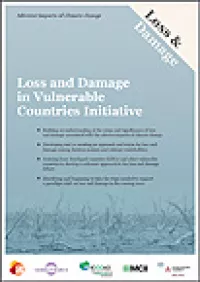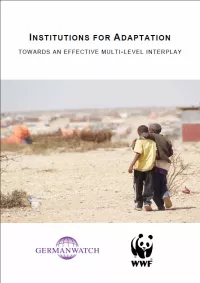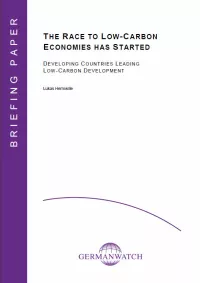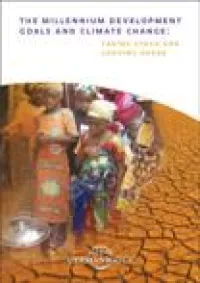Aktuelles zum Thema
Publication
Adverse Impacts of Climate Change
The Loss and Damage in Vulnerable Countries Initiative is focussing on: Building an understanding of the scope and significance of loss and damage associated with the adverse impacts of climate change; Developing and co-creating an approach and vision for loss and damage among decision makers and relevant stakeholders; Assisting least developed countries (LDCs) and other vulnerable countries to develop a coherent approach to the loss and damage debate; Identifying and beginning to take the steps needed to support a paradigm shift on loss and damage in the coming years.
Publication
Facts and Conclusions for Industrial and Developing Countries
Climate change will result in grave consequences for the health of the world population. While industrialized countries have begun to protect themselves by starting adaptation programs developing countries have only limited resources to do so. They however - and especially least developed countries - will suffer most from climate change. Yet historically the global warming is a result of the industrialization in the north although meanwhile emerging economies contribute more and more.
Press Release
Germanwatch presents Global Climate Risk Index at UN climate conference in Durban
While the UN climate summit at Durban has started under the impression of severe local thunderstorms, the climate and development organization Germanwatch publishes its Global Climate Risk Index (CRI) for the seventh time. The index focuses on countries especially affected by weather extremes such as floodings and storms in 2010 and during the past twenty years. The Global Climate Risk Index is based on data collected in the worldwide renowned database at MunichRe.
Publication
Energy Opportunities in Puerto Princesa, Palawan (Philippines) and Denpasar, Bali (Indonesia)
This Briefing Paper identifies opportunities in the local, national, regional, and international level that can assist the tourist island cities in southeast asia in persuing low-carbon development.
Publication
Towards an Effective Multi-Level Interplay
Different institutions play a crucial role in order to promote adaptation to climate change in developing countries. As a contribution to the current political debate, in particular in the UNFCCC negotiations, this paper analyses key institutional approaches on the different levels and makes a number of concrete suggestions with a view to optimising the interplay between institutions on the different level.
Publication
Developing Countries Leading Low-Carbon Development
Although international climate negotiations have made little progress since the largely failed talks of Copenhagen in 2009, especially developing countries have started the race towards low-carbon development. Low-Carbon Development Plans (LCDPs) have been developed that describe goals and measures of the respective nation's climate change efforts and lay a foundation for overall development planning.
Press Release
Cancún must lay the foundation for a comprehensive approach to risk management
With the today published Climate Risk Index 2011 in Cancun, Germanwatch has, for the sixth time, examined which countries are particularly affected by weather extremes. "In 2009, surprisingly, countries such as Chinese Taipei, Saudi Arabia and Australia were also among the ten most affected countries," said Sven Harmeling, author of the CRI at Germanwatch.
Publication
Five years before the rallying-point, World leader and country representatives meet in New York on the Millenium Development Goals Summit from 20-22nd September.
Publication
Climate change threatens to make the already difficult situation of food security in the world even worse. The Fourth Assessment Report of the Intergovernmental Panel on Climate Change (IPCC) - based on the evaluation of many scientific studies - has made a critical assessment of the possible impacts of climate change on agriculture, livestock and fishing, particularly in the countries of the tropics and sub-tropics.








